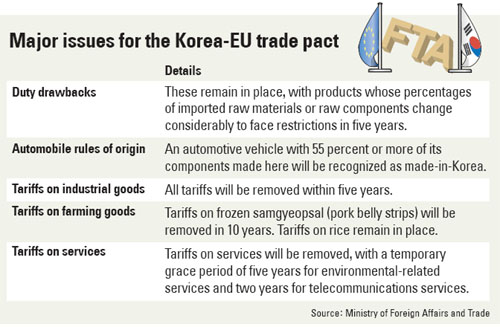EU trade deal would sell cars, hurt farmers
Joong Ang Daily | July 13, 2009
EU trade deal would sell cars, hurt farmers
One think tank says an EU deal would increase Korea’s GDP 3 percent.

The Korea-EU free trade agreement, if it crystallizes as officials hope it will, should open a vast consumer market to Korean exporters - and bring cheaper imports to local store shelves.
The European Union market, consisting of 27 member countries with a combined population of 490 million and an annual GDP of $16.6 trillion, is Korea’s second-largest trade partner. Last year, Korea enjoyed a trade surplus with the EU of $18.4 billion.
Removal of the EU’s average tariff of about 4.2 percent on Korean goods is likely to provide great business opportunities and better margins for Korean exporters, many analysts say. The Korea Institute for International Economic Policy recently estimated Korea’s gross domestic product would expand by up to 3.08 percent a year thanks to an EU FTA.
Korea is relatively stronger in shipbuilding and electronics, while EU nations are better positioned in industries such as pharmaceuticals and precision machinery.
One of the biggest beneficiaries of the trade pact would be the auto industry. About 14.7 million vehicles were sold in the EU last year, 408,934 of them Korean. That makes the EU a bigger market than the United States, with 13.1 million units sold last year. The 10-percent tariff on Korean cars will not disappear overnight, but will be removed in three years for cars with engine displacement of 1,500 cc or more, and in five years for cars with engine displacement of less than that. Especially pleased will be makers of trucks, which are subject to a tariff of over 20 percent.
European carmakers will also enjoy more access to rapidly-growing luxury car markets in Korea. The Hyundai Economic Research Institute (not part of Hyundai Motor Group) said in a report earlier this month that competition among foreign carmakers will intensify here as large sedans from European firms enter the market.
Electronics will see less of a bump, since tariffs on semiconductors and mobile devices have already been lifted. But makers of display panels, video recorders and microwaves will see higher sales. Tariffs on such products are now 14 percent, 8-14 percent and 5 percent, respectively.
The trade pact is set to deal a blow to Korea’s agricultural sector, since the average tariff on imported farming products is a relatively high 41.6 percent. European farm products will be considerably cheaper once barriers is lifted, meaning Korean farmers will face greater competition.
Local pig farmers in particular have been vocal critics of the deal, as pork imports from the EU have rapidly expanded to $469.8 million last year, making it the most popular imported EU farm product.
“It is urgent to come up with a solution to help pig farmers, although they account for a small portion of all livestock farmers,” said Kim Hyung-joo, a researcher at the LG Economic Research Institute.





